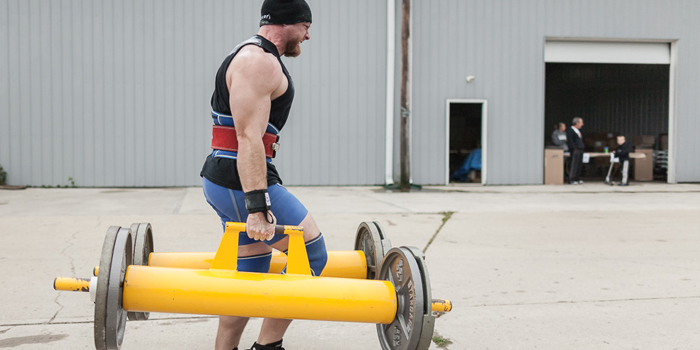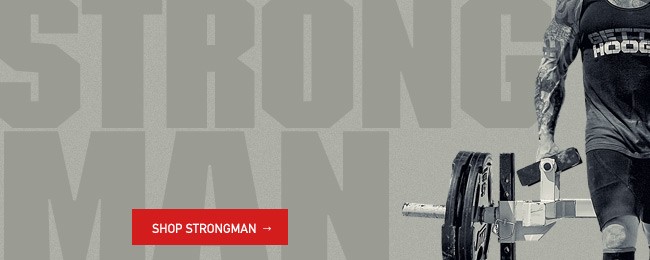
Strongman can be deceiving. It implies that only absolute strength is tested and that the statically strongest person always wins. This cannot be further from the truth. A strongman contest is a series of five different events that can test an athlete's absolute strength, repetition strength, speed-strength, conditioning, athleticism, and equipment mastery. Too often, athletes in the sport tend to focus on absolute strength and forget to think about these other aspects. Interestingly, they're worth just as much, if not more, points on your score by the end of the contest. I want to walk you through an analytical process of viewing the sport of strongman to maximize performance for competition.
Absolute Strength
In almost every contest, you will have a deadlift and an overhead press variation event of the five events. For the most part, your absolute strength carries over to the deadlift, log press, and axle press. Don't get too caught up here thinking the 1RM in these lifts carries over to more than just these lifts. For example, a big deadlift does not necessarily mean a fast yoke run or a fast truck pull. A big log press does not necessarily mean a good circus dumbbell performance. They help, but they are not the sole performance indicators to these other lifts. Again, static strength in these two lifts is important, but they only directly carry over to these two event variations.
READ: Bullet-Proof Knees for Strongman
The deadlift and overhead press variation events have to be the bulk of your offseason training—build strength here. Your contest prep should focus on refining your technique for these lifts. First, take a look at where and why you fail at these lifts and let that direct your accessory work. Next, pick one or two aspects of these lifts that you struggle with (bar path, stabilization, etc.) and train those. Getting better at those will make you better at the main lift. Then go ahead and fill the rest of your training time with lower impact exercises that'll keep your joints and body healthy in the long term. *Cough* cardio and generalized physical preparedness.
After you pick a contest with some deadlift and overhead press variation, question when to start contest prep. The answer is highly variable from athlete to athlete. Some athletes need more event proficiency to maximize their current strength levels with an implement. More proficiency equals a longer prep cycle. Other athletes may have greater event proficiency or natural ability and need less specific work requiring less prep time. With that being said, be honest with yourself. See where you fall on this spectrum to determine how long of a prep you need. Anything longer than 12-16 weeks, including a taper and deload, is, in either case, too much. At that point, spend any extra time getting stronger and healthier during an off-season training block.
Repetition Strength
A huge 1RM on an event doesn’t mean you’ll be able to crank out reps to win. Don’t get me wrong, it helps, but absolute strength is not the sole determining factor to winning a reps event. What about movement efficiency and repetition strength?
Step one in analyzing a reps event is to ask yourself how the weight compares to your current strength levels. If it’s less than 80 percent of your 1RM, you know the bulk of your event training needs to focus on the conditioning, repetition strength, and overall movement economy to maximize your performance. If the event is closer to 85-90 percent of your 1RM, then there should be a solid mix of absolute strength work and repetition work to give yourself the best chance at reps on game day. Lastly, if an event falls in the 90+ range or above your current max, your contest prep focus must be on absolute strength.
Speed-Strength, Conditioning, Athleticism
Scenario 1
This is by far the most underrated aspect of strongman. In a typical strongman competition, three of the events will hinge on speed-strength, conditioning, and athleticism. Static strength or great repetition strength scores well, but if you move like molasses and get winded after 20 seconds, you won’t place high. The common fault I see athletes make is the belief that if they get statically stronger it will magically give them work capacity, speed, and explosiveness. It has to be understood that these qualities, while connected in some fashions to absolute and repetition strength, are stand-alone qualities and have to be trained independently.
Scenario 2
If there’s a conditioning event (max distance carry, etc.) and you can barely move competition weight because it’s so heavy, then you probably don’t need the bulk of your event training to be lighter weight for longer distances. This is where absolute strength in the event will give you the best performance. On the flip side, if the competition weight is manageable relative to your abilities, you probably need to hammer your conditioning and efficiency for the event (recognize a theme yet?). If you find yourself here, understanding the mark to beat is an important training and programming tool. This is where you guesstimate where the top performers will score and train for that mark to ensure you maximize your points earned for that event. Don’t miss out on the podium because you didn’t know what mark to train for and subsequently underperform an event that costs you many points.
Scenario 3
If you find yourself with a distance for time event (yoke, farmers, etc.), this is not about how strong you are, but how fast you are. If you can’t move fast with a weight, you have to ask yourself why. Is it a bracing issue? Dynamic unilateral stability issue? Hip strength? Understand why and train the heck out of that so you can get better at these events without training them all the time. Constantly training events in this sport will wear your body down, especially moving events. So, work on finding ways to get better at these events with traditional strength training methods to save the wear and tear of these events and give you greater carryover to other events.
Scenario 4
I can’t count how many times I’ve seen an athlete in a medley carry something heavy impressively fast. As they transitioned back to another implement 50 feet away, they'd shuffle or light jog, then again be incredibly fast carrying another heavy piece of equipment. Then you see them followed up by another athlete. Although they weren't as fast carrying objects, they were an absolute blur sprinting between the implements, making up that time they lost on the carry. They'll actually end up beating a stronger competitor because of it.
Time is time. It’s counting from the whistle to the finish—everything you do in that span of time matters. Being an athlete and making your body fast carrying weight, along with the transitions between will ensure you achieve the best time you're physically capable of. The takeaway here is to be as fast as you can at all aspects of an event, not just certain parts of it.
Equipment Mastery Strength
The argument I hear too often in strongman is that you don’t need the equipment, you just need to be strong. Although competitors can take the equipment specifications for contest training too far (the exact dimensions of the farmers' handles, car deadlift, etc.), the idea that you don’t need to be proficient with a piece of equipment is absurd. That’s like telling an Olympic discus thrower that they don’t need practice with the discus. Instead, they just need to be powerful. Yes, it helps, but there is a specific technique to every different event we do for our body types. Knowing the details of how to make an event work for you is a significant part of contest preparation.
Lastly, understand the gear permissible for a contest and how your body is best aligns for a movement pattern—this is hugely important.
Pertinent Questions
- Did they say no deadlift suits in the event explanation? If it will help, throw on the suit.
- Did they say no deadlift suit but didn’t mention briefs? If it will help, throw on your briefs.
- Are you able to wear grip shirts or double soft/hard belts for the overhead? If so and it helps, wear it.
- Are you a shorter athlete who can get a wide stance and knees under the bar on an elevated deadlift? I guarantee you can pull more that way than a traditional stance with the bar under your knee.
In the end, use any equipment or technique that is allowed that will help you maximize your strengths or leverages in every event for the sake of gaining the most points on game day.
The Point
Analyze every detail of every event, in every contest you sign up for. Compare this to your strengths and your weaknesses, and let that dictate your training. Stop getting caught up in having a big deadlift and big log press. Yes, these are important but not everything. Don't neglect the aspects of other events that equally determine your final points standings at a show. Far too often, we see a better all-around athlete beat a much stronger athlete because of how they prepared their body for each event.

Mark Clevenger is a practicing physical therapist in the state of Kentucky. He's a current Strongman Corporation and U.S. Strongman competitor and the current head sports performance coach for the dedicated strongman training group, Louisville Strongman. Mark served in the military for eight years. Mark's education and certifications include a Doctor of Physical Therapy degree acquired from Nova Southeastern University, a bachelor's degree in kinesiology acquired from Depauw University, and a CSCS from the NSCA. Check out his website at louisvillestrongman.com.









